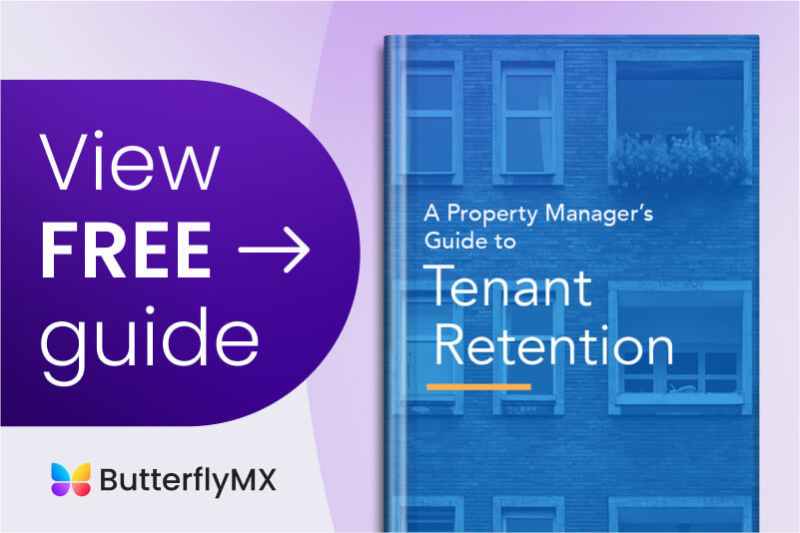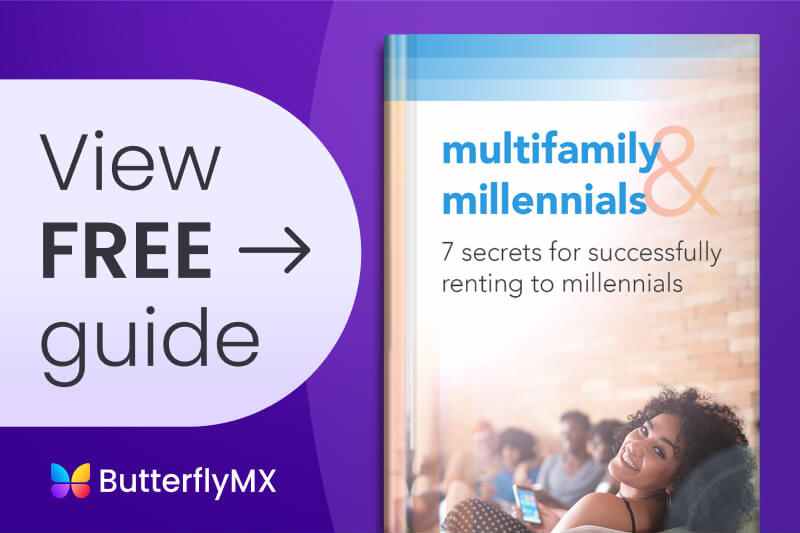
A successful leasing agent has excellent communication and organization skills, not to mention knows fair housing laws and keeps track of multifamily industry trends. So needless to say, it’s a challenging job!
If you want to take your skills as a leasing agent to the next level, follow the nine impactful leasing agent tips this guide provides.
In this post, we cover:
- How to be a good leasing agent
- Top 9 leasing agent tips
- Leasing agent daily checklist
- Leasing agent tips to find prospective residents
How to be a good leasing agent
If you’re wondering “what makes a good leasing agent,” we’re here to help.
Leasing agents assist property managers by finding residents to occupy their units. Finding the right residents for your building is one of the most important aspects of your role.
Leasing agents also act as a resource for both prospective and current residents. Maintaining a great relationship with both residents and property managers alike will help improve your close rate.
Here are a few key ways you can be a good leasing agent:
- Make a good first impression
- Dress for success
- Be proactive
- Stay organized
- Follow up with prospective residents quickly
- Keep an open line of communication
Watch to learn how much you should charge for rent:
Make a good first impression
Leasing agents are often the first point of contact for prospective residents, so it’s essential that you make a great first impression.
Being friendly and asking the prospect questions not only leaves a positive impression but also helps you assess whether they’re a good fit for the property. Making an effort to get to know the prospect by asking them questions about themselves will help you learn valuable information about their housing needs.
Dress for success
Looking the part is just as important as being knowledgeable. Dressing professionally and making sure your attire is clean, appropriate, and presentable will help inspire confidence in your abilities as a leasing agent.
Be proactive
Being proactive is crucial to finding prospective residents. Listing properties on platforms like Apartments.com or Zillow is a great start to find potential residents.
But instead of just hoping prospects come to you, do more to meet them where they’re at.
Mailing out informational flyers, trying outreach marketing with gift bundles, and showing off your property on social media are all proactive ways to reach more prospects.

Stay organized
Leasing agents keep track of appointments, applications, contracts, and contact information. They also have to stay up to date on property records, as well as track vacancies so they can be filled.
That’s a lot of information to keep track of!
Using spreadsheets to track these records is a great way to ensure that you stay organized.
Follow up with prospective residents quickly
Following up with residents right after they inquire or take a tour is one of the most effective ways to boost your close rate.
First of all, prospects will lose interest quickly if you don’t get back to them right away. So, don’t miss out on leads by being slow to respond.
Additionally, taking the time to call or send a personalized email to each prospect after a tour will leave a lasting impression. This guarantees that your property stands out, which is vital because most people tour several properties before choosing the best fit. It also helps foster a positive relationship between you and the prospective resident.
Keep an open line of communication
Leasing agents act as a liaison between the building and the prospective resident. Being responsive and communicative will ensure that your building remains top-of-mind for prospects. Prioritizing communication helps provide a more seamless experience and gives prospects a better impression of the building.
Top 9 leasing agent tips
Leasing agents are an essential component of any multifamily property. After all, finding suitable prospects is one of the most vital aspects of managing a building.
Whether you’re curious about becoming a leasing agent or you’re already in the role and looking to improve your skills, the following leasing agent tips will help you excel.
Top 9 leasing agent tips:
- Stay up to date with Fair Housing laws
- Accurately represent the property
- Prepare for tours
- Have extensive knowledge about the property and the neighborhood
- Be prepared to answer questions
- Highlight amenities and perks
- Ask your own questions
- Send thank you emails
- Be available for follow-up
1. Stay up to date with Fair Housing laws
Fair Housing laws are designed to protect the rights of any resident that occupies the building. These laws are in place to protect residents from housing discrimination.
So, knowing these laws is essential for protecting the rights of residents and protecting yourself from liability.
2. Accurately represent the property
Representing the property honestly and accurately is crucial.
Each resident has unique housing needs, and your building won’t be the perfect fit for everyone. That’s ok!
By accurately representing the property, you won’t waste time on prospects who aren’t a good fit. And ensuring that you rent to residents who are a good fit will also lead to more long-term leases.
3. Prepare for tours
Most prospects want to tour the building before signing a lease. And if you’re leading a tour, you’ll want to make it the best possible experience. To do this, you can implement a wide variety of tools, such as self-guided touring or property management software.
Regardless, here’s how to prepare for tours:
- Make sure that the property is clean and ready for viewing: Showing a property that’s in disarray will give the resident a negative impression of both you and the building.
- Double-check that all appliances are working properly: Arrive at the property early to confirm that all essential appliances like A/C units, water heaters, sinks, toilets, and ovens are in working order. Making sure that the property is functioning as it should can also incentivize prospects to sign leases.
- Make sure that the property is in great condition: Ensuring that there are no signs of wear and tear in the unit you’re showing is a vital leasing agent tip. It’s important to resolve any damages before scheduling tours with prospective residents.
4. Have extensive knowledge about the property & the neighborhood
Knowing the building’s specifications like square footage, accessibility to public transit, and schools in the neighborhood will help you determine if the property is a good fit for the prospect. It’s important to be familiar with these specifics prior to their arrival so that you can address any questions that may arise.

5. Be prepared to answer questions
Naturally, residents will have questions about rent, utilities, apartment modifications, building security, and the lease agreement. Answering these questions accurately leaves a positive impression. It also helps streamline the move-in process if the resident decides to sign a lease.
6. Highlight amenities and perks
Residents want to know about the amenities offered at the building. Amenities like fitness centers, pools, in-unit washers/dryers, and rooftop access are all things that may incentivize a resident to sign a lease with you.
Highlighting perks like rent stabilization, guest parking passes, and annual building upgrades will also help boost your close rate.
7. Ask your own questions
Answering questions is essential to being a great leasing agent, but you should also ask your own questions, like when the prospect is looking to move in or what their property needs are. Asking questions not only shows that you’re engaged but also helps you determine the needs of the resident and whether the property is a good fit for them.
8. Send thank you emails
Taking the time to send a thank you email after each tour will help you and the property you’re representing stand out. As a result, you’ll boost your close rate.
9. Be available for follow-up
Residents may have a few questions about the property after their visit. Being available to answer these questions will help boost the likelihood of them choosing your property.

Leasing agent daily checklist
Now that you’ve learned several effective leasing agent tips for apartments, you’re on the right track to success.
But don’t stop there.
On a day-to-day basis, you should also implement a few best practices to make sure you stay organized.
Here’s a solid daily checklist for leasing agents:
- Walk-through the property prior to the prospective resident’s arrival: To avoid surprises like broken appliances or property damage, inspect the property and resolve any issues that may arise prior to showing it.
- Check voicemail/email frequently: Be available to address the needs of both prospects and property management. Checking your voicemail and email regularly will ensure that all issues are addressed promptly. It also limits the likelihood of missing leads.
- Make sure application packets are ready: You’ve shown the property and the prospective resident loves it — now it’s time to close. Having applications at the ready will help streamline the leasing process and fill vacancies sooner.
- Confirm move-in/move-out appointments: Moving in and moving out can be a hectic process for both you and the resident alike. Ensuring that all the necessary documents are signed and ready will help you navigate that process.
- Stay on top of lease renewal applications: Returning residents are a great sign that the property is succeeding. Making sure that residents can quickly and easily renew their lease is a valuable part of your role.
- Resident screening: Be sure to promptly verify employment and perform background checks when someone applies.
- Follow-up with prospects after tours: Following up immediately after a tour can work wonders. Addressing any concerns, reservations, or simply answering questions about the neighborhood will help you connect with the prospect and increase your close rate.

Leasing agent tips to find prospective residents
You’ve now learned important leasing agent tips to improve your skills in many areas. But you might still need some help with strategies to actually find suitable residents to occupy the property.
3 effective ways to find prospects:
- Use social media: Staying active on social media helps boost awareness of your company’s brand and your building.
- Post your building on rental listing sites: Platforms like Apartments.com, Zillow, and even Facebook Marketplace make it easier than ever to post vacancies and get more eyes on your property.
- Stay in touch and make connections: Social media platforms are a great way to get your building’s name out there. Fostering a good relationship with current residents can also lead to them recommending the property to colleagues, friends, or family.
Takeaways
Implementing these leasing tips for apartments will not only help improve your close rate but also ensure smooth building operations. Improving your skills and knowing what makes a good leasing agent is essential to excel at your job.
- Be proactive when finding prospects
- Quality check the property before tours
- Follow-up
- Ask for feedback
- Prioritize communication
- Stay on top of pending/completed work orders
- Have applications at the ready
- Keep track of lease renewals
- Have quality resident screening practices
- Promptly address any resident concerns







